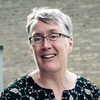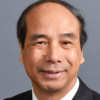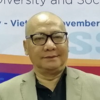Live at the Goethe-Institut, Hanoi and at the Deutsches Haus, Ho Chi Minh City
Registration at 6:30 p.m.
Start at 7 p.m.
Online via Zoom
Start at 6:45 p.m.
ZOOM-LINK TO THE DISCUSSION
Artificial intelligence (AI) and the information age are bringing us more information about ourselves and each other than any society has ever known. Yet at the same time it brings machines seemingly more capable of every human endeavour than any human can be. What are the limits of AI? Of intelligence and humanity more broadly? What are our ethical obligations to machines? Do these alter our obligations to each other? What is the basis of our social obligations?
In her lecture Joanna Bryson will argue that there are really only two problems humanity has to solve: sustainability and inequality, or put another way: security and power. Or put a third way: how big of a pie can we make, and how do we slice up that pie? Life is not a zero-sum game. We use the security of sociality to construct public goods where everyone benefits. But still, every individual needs enough pie to thrive, and this is the challenge of inequality. Joanna Bryson will argue that understanding these processes answers the questions above. She will then look at how AI is presently affecting both these problems.
About the experts
Professor Dr. Joanna J. Bryson (Professor of Ethics and Technology at Hertie School)
 Photo (cut): © Wouter van Vooren
is an academic recognised for broad expertise on intelligence, its nature, and its consequences. She advises governments, transnational agencies, and NGOs globally, particularly in AI policy. She holds two degrees each in psychology and AI (BA Chicago, MSc & MPhil Edinburgh, PhD MIT). Her work has appeared in venues ranging from reddit to the journal Science. She continues to research both the systems engineering of AI and the cognitive science of intelligence, with present focuses on the impact of technology on human cooperation, and new models of governance for AI and ICT.
Photo (cut): © Wouter van Vooren
is an academic recognised for broad expertise on intelligence, its nature, and its consequences. She advises governments, transnational agencies, and NGOs globally, particularly in AI policy. She holds two degrees each in psychology and AI (BA Chicago, MSc & MPhil Edinburgh, PhD MIT). Her work has appeared in venues ranging from reddit to the journal Science. She continues to research both the systems engineering of AI and the cognitive science of intelligence, with present focuses on the impact of technology on human cooperation, and new models of governance for AI and ICT.
Professor Dr. Ho Tu Bao
 © Ho Tu Bao
is director of the data science lab of the Vietnam Institute for Advanced Study in Mathematics (VIASM) and scientific director of John von Neumann Institute of Vietnam National University, Saigon.
© Ho Tu Bao
is director of the data science lab of the Vietnam Institute for Advanced Study in Mathematics (VIASM) and scientific director of John von Neumann Institute of Vietnam National University, Saigon.
Ho Tu Bao graduated (1978) from the Faculty of Mathematics-Physics, Hanoi University of Science and Technology, Master (1984) and PhD (1987) at University Paris 6, and habilitation (1998) at University Paris 9, all in Machine Learning (ML) and Artificial Intelligence (AI).
He has vast experience in doing research, application and teaching in artificial intelligence, machine learning and data mining (DM), and in data science (DS). He worked as professor and head of machine learning and data mining lab at Japan Advanced Institute of Science and Technology (JAIST) during 1993-2018, and has been professor emeritus of JAIST since 2018.
His current main focus is on R&D projects using machine learning in different areas in Vietnam. His advice is much sought after in research, industry and politics.
Dr. Duong Ngoc Dung
 © Duong Ngoc Dung
Senior Lecturer in International Relations Studies, Psychology of Religion, and History of Christianity & Islam (Department of Philosophy), University of Social Science and Humanities, Ho Chi Minh City.
© Duong Ngoc Dung
Senior Lecturer in International Relations Studies, Psychology of Religion, and History of Christianity & Islam (Department of Philosophy), University of Social Science and Humanities, Ho Chi Minh City.
He achieved his Master degree in East Asian Studies at Harvard University in 1995, his Ph.D in Religious Studies at Boston University in 2001. In 2010, he was Professor of Marketing Management, HR Management, and Intercultural Business Communication Management at Paris Graduate School of Management.
Dr. Dung also teaches soft skills including logical thinking, critical thinking and effective presentation, communication and negotiation for many enterprises and Non-Governmental Organizations.
Back